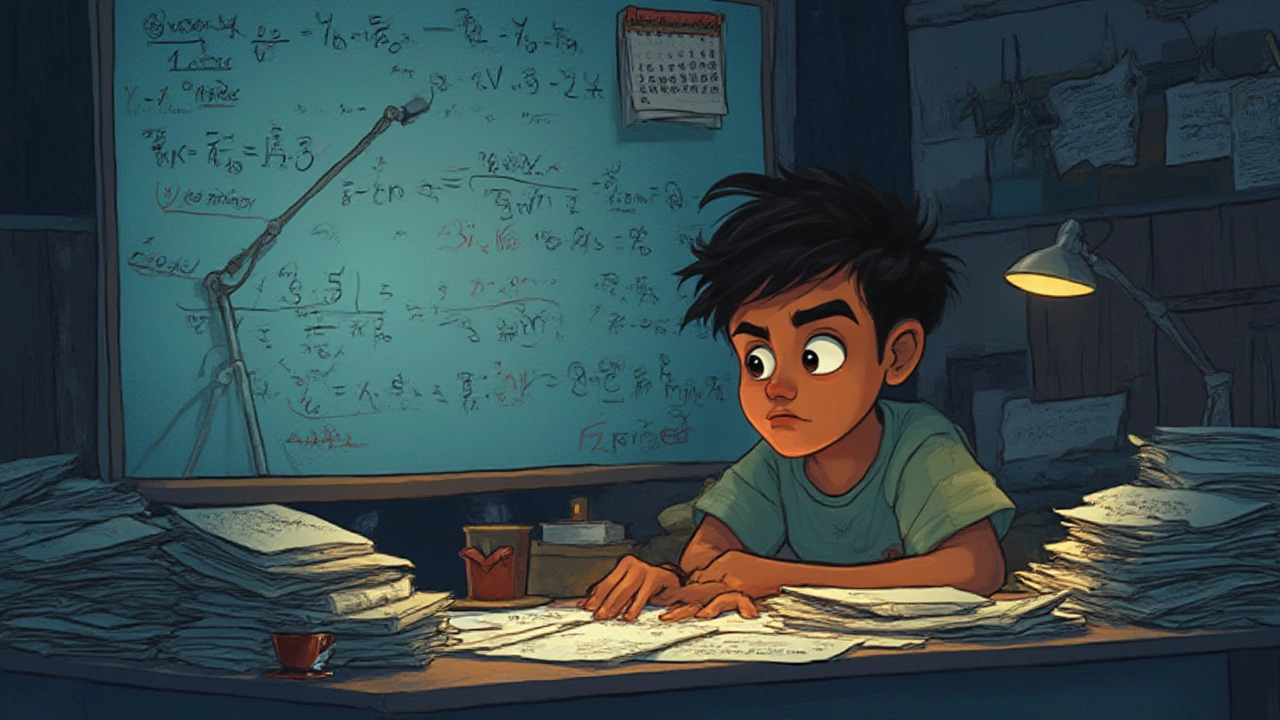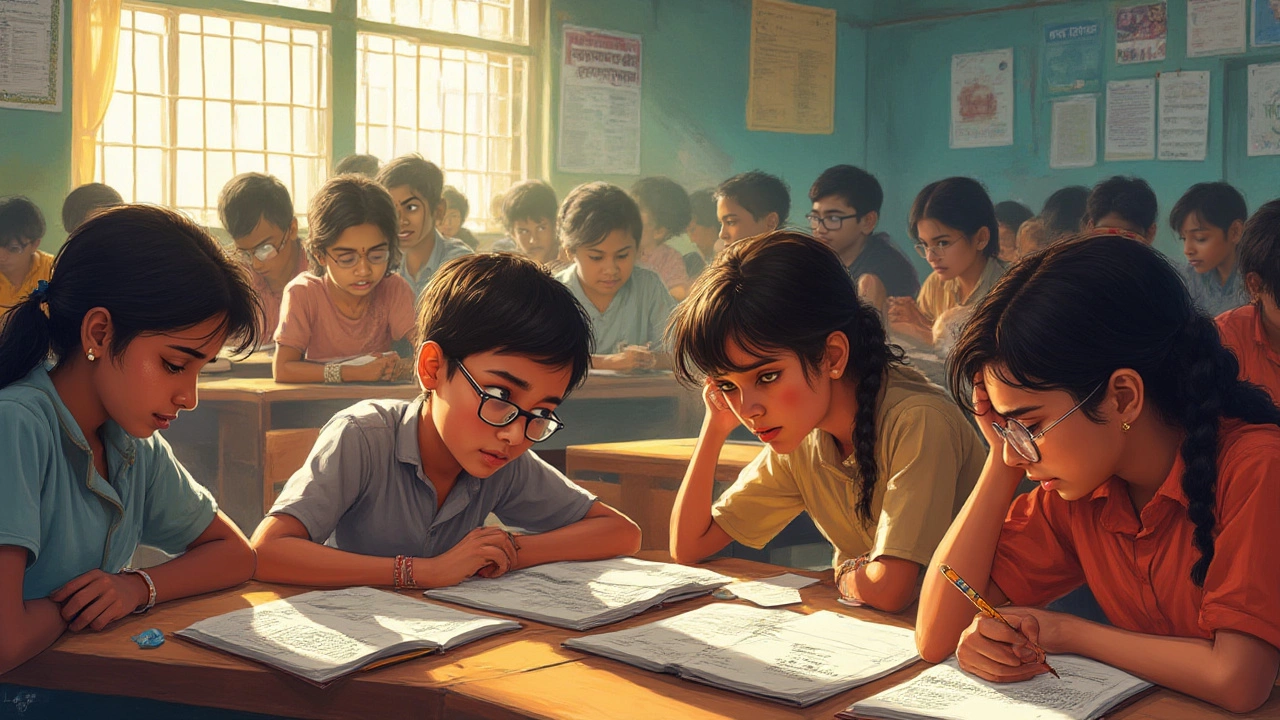Picture this: it’s just after midnight, you’re hunched over a textbook, highlighter ink fading, and your phone is buzzing with frantic group chats debating the toughest question right now—what’s actually the hardest subject in CBSE? If you’ve ever burned the late-night oil over quadratic equations, organic chemistry, or struggled to juggle timelines in History, you’ve probably wondered the same. Truth is, this debate never gets old. It pops up every exam season, fills lunch breaks, and divides folks faster than a hot samosa at a school canteen. Is there a clear answer? Not really. But the journey to figure it out is half the fun—and pain. Here’s why everyone has an opinion, what the data says, and how you can not just survive but crack even the infamously “toughest” CBSE subjects.
The Subjects Students Struggle Most With
If you walk into any CBSE classroom from Delhi to Chennai, you’ll hear the same suspects cropping up when someone asks, “Which subject is the hardest?” Mathematics, Physics, and Chemistry usually top the table, especially in classes 11 and 12. Some students will throw in Biology, especially with its Latin words and endless diagrams. English seems easy, until you’re swept away by unseen passages or vague essay topics. Then there’s Accountancy, Economics, and even Geography threatening nervous breakdowns for commerce and humanities students.
Mental blocks toward certain subjects often come from early school experiences. Ask any student why they hate Math, and you’ll hear tales from Class 5: teachers who moved too fast or the dread of that one surprise test. A neuroscience paper from 2022 found that anxiety about Math activates the same parts of the brain as physical pain—no joke. Chemistry, meanwhile, has its own set of traps. Those who breeze through Physical Chemistry can get flattened by Organic’s dozens of reactions, or by Inorganic’s confusing periodic trends. Physics hits hard with its mix of Math and concepts that seem to defy logic. Many toppers admit that conceptual clarity is half the battle. Then there’s History—stay awake through a lecture on Mughal tax policies, I dare you.
While it’s tempting to blame syllabus length or “bad question papers,” the CBSE curriculum is largely standardized and reviewed every few years. Still, CBSE board exams have a reputation: questions that seem simple but eat up your writing time, marking schemes that reward clarity more than flowery language, and sample papers that never look quite like the real thing. This all feeds into a sense of dread, probably more than the actual content should. Rarely, though, does everyone agree on the toughest subject—so much depends on who’s teaching, who’s learning, and sometimes luck on the day.
Why Some Subjects Feel Tougher Than Others
Let’s talk about the psychology first. Imagine you walk into a class convinced you won’t get any of it. That expectation strikes early: if you tell yourself, “I can’t do Physics,” your brain checks out before you open the book. According to education researcher Dr. Ashwin Patel, a fixed mindset is the number one reason why one student finds Accountancy impossible while another thinks it’s a cakewalk. Peer pressure ramps this up even more. If everyone around you groans about Organic Chemistry, you start to cringe at the mere mention of ‘benzene ring’—even if you’ve never tried the chapter.
CBSE’s structure plays a role too. Each subject isn’t just about learning fresh stuff every year; it’s a ladder. Chapters build on each other, and if you miss rungs early, you’re left clinging for dear life by final exams. Take Mathematics—get confused about trigonometric identities in grade 10, and class 12 calculus will feel like it’s written in an alien script. Or English: if you’re shaky on comprehension and summaries in grade 8, analyzing Shakespeare in grade 12 gets a whole lot harder.
There’s also memory versus understanding. History and Biology famously demand page after page of facts, names, and tricky terms. The history topper from last year’s CBSE batch, Ria Malhotra, claimed she filled four notebooks with revision notes and still discovered new subtopics a week before finals. But Physics and Math? They require deep logic and connecting dots between different chapters—rote learning won’t cut it. So, whether you find a subject tough or not depends hugely on if you’re a rote-learner or someone who likes connecting ideas.

What the Numbers Say: Results and Rankings
Numbers don’t lie—at least, when it comes to pass percentages and average scores in CBSE board exams. Let’s cut through the drama. CBSE’s annual result reports show that Mathematics (especially at higher level) has the lowest average scores. In 2024, only about 67% of students scored above 60 in core Math, compared to 74% in English. Chemistry and Physics follow close, with their average marks hovering in the low seventies. Commerce students sweat over Accountancy, with nearly 28% of students rating it as the “most difficult” in an informal survey taken at Delhi’s largest coaching hub, Rajinder Nagar.
But here’s an interesting twist: difficulty is shifting. Between 2019 and 2023, a lot of students started struggling with English after paper patterns changed. More HOTS (higher order thinking skills) questions came in and the unseen passages became longer, trickier. A 2023 survey by “CBSE Students Circle” on Instagram got 22,000 responses. The split was: 41% thought Math was toughest, 30% said Physics, but a surprising 15% put English on top, with the rest scattered over other subjects.
Order of difficulty from most surveys (2023-24): 1) Math, 2) Physics, 3) Chemistry, 4) Accountancy, 5) Biology. But this isn’t set in stone. Some years, it’s the History paper that does the ambushing. One big factor? Length of the question paper. Science and Math papers are notorious for being lengthy, with lots of steps and calculations. Social Science and English usually have more theory, meaning more writing and less time for each answer.
How to Tackle the Toughest Subjects: Tips and Survivor Stories
If “toughest CBSE subject” was cast as a villain, then toppers, teachers, and battle-hardened students have learned how to fight back. Winning in any subject, even the ones everyone dreads, comes down to a few reliable tactics. The most successful CBSE toppers swear by smart, targeted revision over mindless hours at the desk. And here’s the shocker: being naturally good at a subject doesn’t beat deliberate, strategic practice.
- Break big chapters into micro-tasks: Staring at “Organic Chemistry” as a whole is scary, but rewriting three important reactions or practicing five math problems a day? Way easier—and it adds up.
- Teach-back technique: Try explaining a complex topic to a friend or your grandma. If you can teach it, you’ve nailed it. That’s how topper Mehul Jain finally grasped the Doppler effect for Physics in 12th grade.
- Use varied resources: Don’t stick to just NCERT textbooks. YouTube lectures, flashcards, sample paper books (like Oswaal or Arihant), and teacher-made mind maps can light up a topic you found impossible just yesterday.
- Past years’ papers are gold: CBSE has a sneaky habit of twisting old questions. Practicing them gets you used to the style, builds confidence, and helps predict which chapters always show up.
- Don’t ignore break time: The brain forgets fast when tired. The Pomodoro method (25 mins study, 5 mins break) seems basic but it keeps your focus sharp.
One student, Shruti Pal, turned her dread of Accountancy into her highest score by making a habit of 15-minute quick recaps before sleeping. Meanwhile, Hyderabad’s Vinay Arora used colored sticky notes for tricky Biology terms and stuck them on his cupboard—hard to escape a term when you see ‘glycolysis’ every time you open your shirts drawer! There are no one-size-fits-all hacks, but giving yourself time, asking for help early, and not giving up on a topic after the first struggle can save you heartache.
Nobody gets a perfect score on every paper, and everyone finds something tricky—sometimes the subject, sometimes the teacher. Identifying the “toughest” CBSE subject might look different from your perspective or your friend’s, but the real badge of honor? Dragging a subject from “impossible” to “yep, I can do this.” That feeling beats any mark sheet, every single time.
